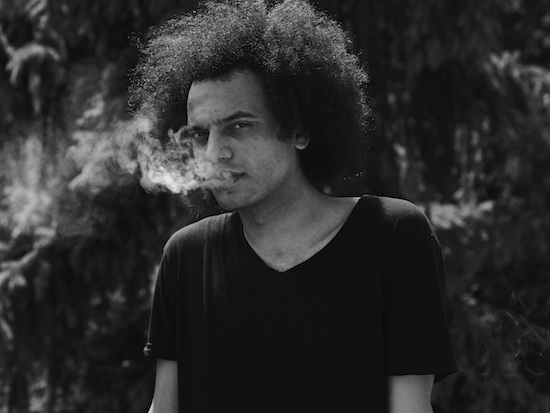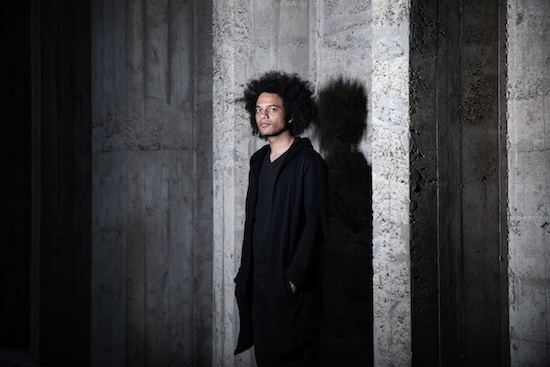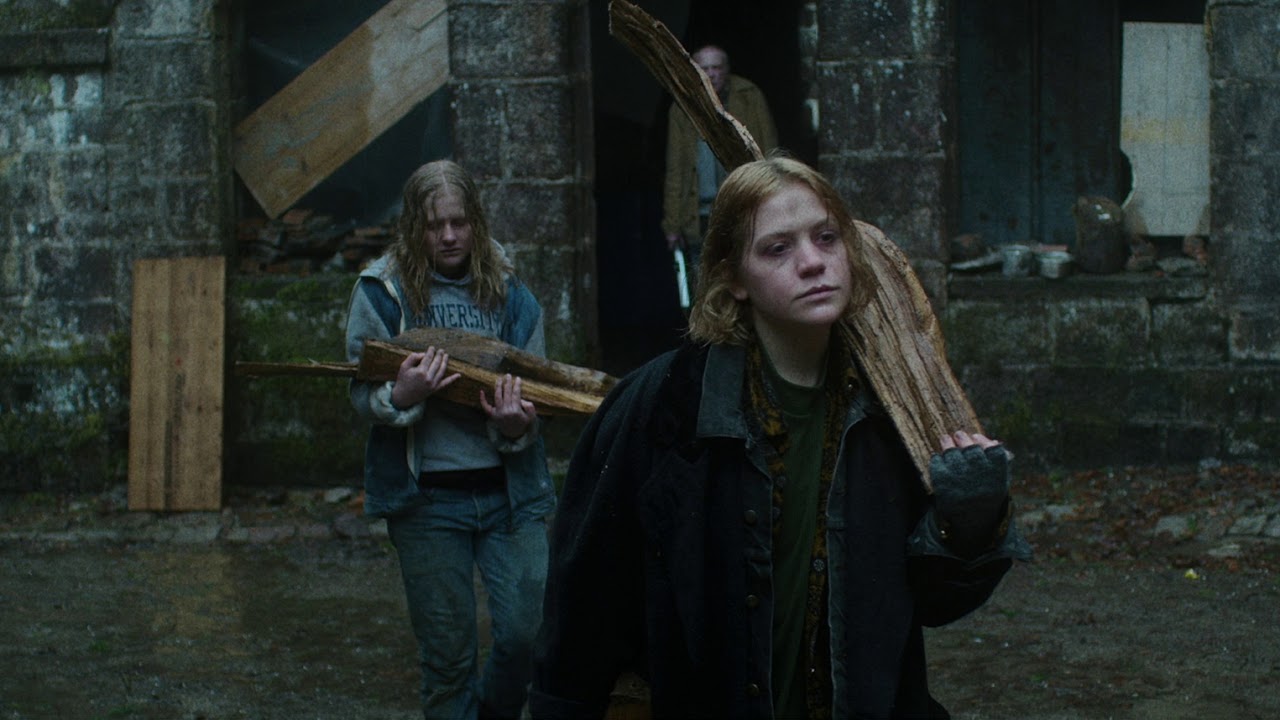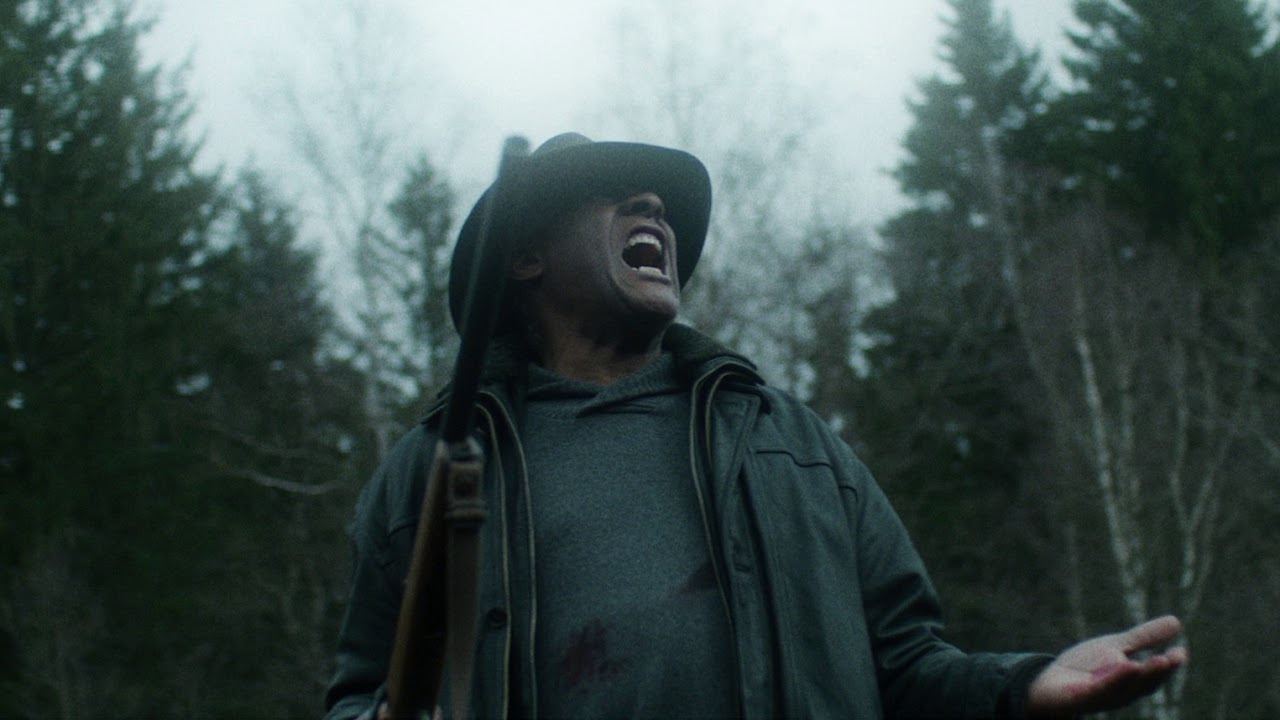Zeal & Ardor main portrait by Matthias Willi
Stuck on a long drive to Toronto, on the last leg of what has been a mammoth 12 months of touring, Manuel Gagneux is contemplating having just turned thirty. “I’ve kinda been too busy to think about it, which is probably good.” I sympathise – I’m turning forty next year I say. “Is that a big thing? Do you worry?” I tell him it’s been praying on my mind somewhat; these things are never ‘a thing’ until they’re ‘a thing’. “That actually makes a lot of sense. Maybe once I get home I’ll have a little cry about it or something.”
It’s just another milestone in what has been a stellar year for the Swiss musician. This time last year he was still putting the finishing touches to Strange Fruit, his second album as Zeal & Ardor, and the record that would introduce his unique mix of blues, gospel, soul, spiritual, shrieking vocals and aggressive dissonance to a far wider audience. Dubbed “the black metal bluesman”, his appearance at Eurosonic in January – one of the showcase’s ‘must see’ sets – started something of a frenzy among booking agents keen to have his blistering, intoxicating show grace their own events, and he’s been on the road ever since.
Yet Gagneux’s singular vision – blending various strands of black music with black metal, and posing the question: what if the slaves of the Deep South had turned to Satan instead of God? – has ruffled just as many feathers as it has gained ardent followers. Many in the black metal community are nonplussed, dismissing Zeal & Ardor as, at best, a dilution of what makes their genre so special and at worst, a cheap gimmick. There have also been rumblings regarding cultural appropriation, and just how seriously Gagneux takes some of his source material.
It would be easy to see such complaints being racially motivated, but Gagneux is dismissive. “I really don’t think it’s that much of a race thing,” he says. Besides, there’s a thematic depth to his art, drawing parallels between the way Christianity was imposed on both the slaves and Norwegians and using an image of Robert Smalls on the cover of his debut, that suggest his intentions are hard to doubt. Like many of his peers, Gagneux has some timely messages for us; with the world in turmoil, we’d do well to pay heed.
It’s been quite a stellar year for you, even before the album came out. How has it felt being in the middle of such a meteoric rise?
Manuel Gagneux: It’s funny, I only learn these things peripherally because I live in Switzerland where that doesn’t really matter, or people just don’t really know. I am semi-conscious of it, but I’m not really confronted with it, so I just carry on working.
So you don’t really notice things blowing up, in that sense?
MG: Actually, I make an effort not to, because I think the quality would suffer, or maybe I’m just paranoid. But to focus on that is not exactly healthy.
Eurosonic has the ETEP (European Talent Exchange Program) program, which you were part of, which aims to “boost the international careers of European artists”. Do you feel it helped you raise your profile and reach new audiences?
MG: It’s hard to say because it only caters to a certain group of artists, those that are already in people’s consciousness. For ‘up and comers’, it’s probably not the best thing. It’s also a form of gate keeping, but for us or a group like Superorganism, it’s a perfect, perfect programme. It definitely works.
Stranger Fruit is a slightly mellower, more expansive listen than your debut. What specifically did you learn from Devil Is Fine and people’s reaction to it that you wanted to take into the new record?
MG: I just wanted to make a structurally more cohesive record, and I wanted to respect the album format, because we probably don’t have a lot of time left where “the album”, as we know it, is accepted as a format. As long as I have the chance to still do that, I thought I might as well have something that you can sit down and listen to from beginning to end, whereas Devil Is Fine was just a collection of songs that I had at the time.
The death of the album has long been prophesied, but there are certain artists, like yourself, that would struggle if “the album” didn’t exist and they just released individual songs and relied on streaming charts.
MG: Definitely. I think there isn’t the same instant gratification you get with pop music in metal in general, or in rock actually. So we rely on the format of an over-arching narrative, or just one weaving sequence of emotions or mood. It’s more about atmosphere than about that quick fix.
I read the interview you did with The Guardian, where you said you were “culturally appropriating in two different directions.” And as far as I can see from online reactions and so on, there’s only one group that’s pushing back against your appropriation, and that’s the black metal community. What does that say about them, and those that belong to it?
MG: Well, the first instinct is to say that they’re very sensitive and it’s telling that it is exactly that group. They’re protective about their culture, but I think the basic fact is that Christians don’t listen to my music, so they aren’t even aware; I don’t think the gospel community is really listening to me. If they were, then I’m pretty certain there would be a comment or two. It’s as simple as that.
Would it be different if you were white? That the black metal community would be: ‘Oh, we’re fine with this’?
MG: I don’t really think it’s that much of a race thing. It’s just that the black metal community is very protective of their music because they identify with it, so it’s more about bastardising the music than any racial appropriation, I believe. Then again, I don’t know and I’ve never been white, so I can’t really give a definitive answer I’m afraid.
Because on a certain level, you’re just taking various ideas and expanding on them and running with it, mixing it with different forms, which ultimately all music is.
MG: Exactly. To say that one style of music is exclusive to one group of people is just regressive, and everything is a hodgepodge of different influences. It’s hard to segregate, even if you wanted to.

In that same interview, while talking about cultural appropriation and intent, you said: “Well, my intentions are good.” But, in the world we live in, with Twitter and social media, accusations of cultural appropriation get thrown around all the time by all sorts of different people. It’s impossible to know where to draw the line, or to gauge who’s being genuine.
MG: Yeah. In the end, one could argue that it’s a very subjective matter, but I stand by what I said, that it’s about intent. And, of course, intent is hard to prove or disprove. The bottom line is that if someone wants to make something good…even if the product ends up being terrible, the fact that a person can be influenced by a culture that he or she is not part of is instrumental to cultural growth.
It’s interesting that, especially in the US, genres like blues and gospel are held up of evidence of the joyful resistance of the human spirit, but if you look at the genesis of where the music comes from, it’s anything but. It’s almost like it has been collectively romanticised by the wider public to make it more palatable.
MG: I think you can attribute a certain beauty to it; no one can argue that it’s not there, even if it casts a shadow over the origins or the actual tragedy of it. You can also see how, especially in Europe, how blues music is presented. It’s played in upscale venues most of the time, where blues legends play to primarily white audiences. It has this luxury carnival or circus flair thing, where I guess the people who would have used that music to express their lamentations wouldn’t even have access to it anymore. It’s kind of bizarre.
It’s like it’s just another effort to airbrush violence and racism from the history of an entire country. To say: “Oh, it’s all in the past”, like collective amnesia.
MG: Yeah, but I wouldn’t say that it’s a deliberate effort to do so, I don’t think it’s an intentional move; that would be very cynical. It’s just how it panned out.
Your music also plays with ideas of religion and Christianity. It always amazes me that so many people that fight oppression, whether they’re black or white, are sometimes themselves so stridently religious which is something that has been, and continues to be, the source of so much hate, violence, and discrimination. It completely baffles me.
MG: I know, but what strikes me as weird is that it enjoys this strange form of impunity. If someone is pious or religious, then that’s always a very noble aspect to a person, and it’s immune from criticism. I’m not saying that the act of following a religion is something you shouldn’t do, but it’s just that there’s no critique allowed and that’s bizarre. Even though, like you said, it’s the cause of hundreds and hundreds of years of pillaging, rape, and oppression. It’s an odd world.
There’s also the plausible deniability side of it, in that some people say: “Oh, but it’s not my church that hates homosexuality,” or: “It’s not my church that’s abusing children. It’s those other people.” And you think, yeah, but you’re supposed to all be under the same umbrella, right? It’s a weird form of cognitive dissidence.
MG: Yeah, especially if it’s a religion that has missionaries expanding the religion, actually bringing people under that umbrella. It seems kind of hypocritical to exclude oneself or others from responsibility.
Stranger Fruit references not just the Nina Simone song, but also the poem by Abel Meeropol. When you look at both those pieces of art, the last few years have really highlighted how little has changed in the world, especially in America when it comes to race and things like that. It’s quite the bitter pill after the hope of the Obama era.
MG: It’s bizarre how the status quo has switched, cos now it’s acceptable to have these [far right] opinions. There’s this ease now with which people carry that into the streets, and it’s like twenty steps in the wrong direction. And the same thing is happening in Europe, too. There was this huge march, something like sixty thousand fascists gathered in Poland, and I don’t know where these people came from or what instigated that, but it was the certainty with which they came out onto the streets. It’s frightening to be honest.
There’s the AfD in Germany, and Orbán in Hungary too. It’s scary to look at Europe politically, at what’s happening.
MG: It’s a disgusting display of horrible people, but my hope is that there’ll be a knee-jerk reaction against them because it’s not a common-sense consensus; it’s not the status quo. These are far-right extremists, and extremists are not normal. That’s what gives me hope.

Portrait by Matthias Willi
The other interesting duality through the album is with the imagery of, and the language of, Satanism. Most people probably aren’t aware of the history of that and its more positive aspects, and just conflate it with church burning, and devil worship. Are you trying to educate people as well as entertain them to a certain extent?
MG: I wouldn’t say I’m educating anyone. I just use elements that I personally like, and it would be very arrogant of me to say I’m trying to educate. I used the more empowering aspects of Satanism – you know, the acceptance of the ego, the pursuit of ego and self-fulfillment as a life goal, which is something I believe a lot of people can strive for. But I’m not on a mission by any means, its just things I like.
Do you still have the branding iron on your merch table?
MG: It’s not currently with us, but it’s still very much alive and well. We haven’t used it since that interview, where the cat was kind of let out of the bag for the reason we used it. It’s just a nice relic to have.
What about people getting things like band lyrics or symbols tattooed on themselves? Is that not the ultimate form of homage to people’s heroes or idols?
MG: It is, but I’m not really much of a fan of that because you can’t have your body under the guise of one sentence – life isn’t that simple! You can’t say, “We will rock you!” is your motto for every situation. Of course, it’s humbling, or very, very nice to have, but it’s just something I personally would regret doing within a year, at least.
Are you worried that “Black metal bluesman that brands fans” could become a neat little soundbite that defines you forever?
MG: Err, yeah. I make the effort now not to paint myself too much into a corner. Of course, I can’t change people’s perceptions of me and I’m at peace with that, but yeah. I do other things! As long as I don’t define myself like that, then I’ll be fine, because I don’t have any control over other peoples opinions.




